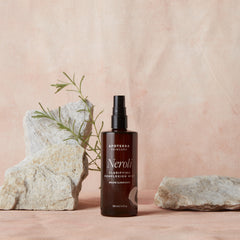HELP! I'm in my 20s/30s/40s and I'm breaking out!
By Lizzy Moran, Holistic Hormonal Wellness Coach
Acne, that special friend you thought you parted ways with when you said goodbye to your teenage years. Now all of a sudden you are breaking out, only this time you’re in your late 20’s or 30’s or even 40’s! Really!? Just like in your teenage years, hormones were to blame then and are most likely to blame now.
Studies have shown that between 12-22 percent of adult women experience some form of acne.
Navigating how to clear up your skin can be a long, frustrating, isolating journey. It is not just a physical burden to carry but very much an emotional one too. It can have an impact on your self perception, social life, professional life and emotional health. Acknowledging the physical and mental toll acne can have on a person, I want to share a profound realization I had after experiencing 15+ years of acne: our skin is a reflection of our internal health.
First and foremost, this is not your fault. Life is busy and stressful and identifying how to get rid of acne can be complicated. With a little curiosity, and some grace for yourself, we’ll throw some more tools in your belt so you can navigate your way back to clear, radiant skin in no time.
Below we will explore some areas of your life that may be influencing your hormones and potentially causing your acne. If you want to dive deeper into understanding the world of hormones and their influence on your skin, download our ebook Lifestyle Foundations for Hormonal Health and Radiant Skin or check out our recorded webinar on Hormonal Acne!
Now let us dive into some possible causes of your hormonal acne. Note: Information in this post is provided for informational purposes only. This information is not intended as a substitute for the advice provided by your physician or other healthcare professional.
Did you just get off the pill?

If you have just recently gone off the pill you may see a surge in acne. When you stop taking certain oral contraceptives the ovaries can release a surge in androgens as they kick back into gear to start ovulating again (the pill suppresses ovulation). High androgens can be a common culprit of acne due to their influence on increasing the production of oil or sebum released from sebaceous glands. This perspective, though not conventional, is substantiated by strong anecdotal evidence and discussed extensively by leading Doctors in the world of holistic health.
When one goes off the pill, our bodies may take some time to recalibrate before the natural conversation between our brain and reproductive system comes back online and can take over the role of sex hormone production again. If symptoms are lingering 3 to 6+ months after you go off the pill, it could be wise to have a conversation with your doctor to gain some clarity on your situation. Your body may need additional support by way of herbs, diet shift or supplementation during this time of transition. A conversation with your doctor or trusted healthcare practitioner sparked by some of the questions below can add further insight into your current hormonal health and may point to an obvious next step in your journey. Please note, it is important that your provider holds space for your experience and listens and respects your preferences and decisions around your health:
- What your menstrual cycle looks like: do you get your period regularly (consistently every 24-35 days)? Are you 35+ and it is becoming more irregular/could you be entering perimenopause? Are they heavy or light? Is your period MIA?
- Are you experiencing other symptoms? Hair loss on head, facial hair growth, weight gain in the mid-section, infertility, fatigue, etc.
- Hormone testing: An understanding of where your estrogen, progesterone, androgen and thyroid hormones are can give you a deeper awareness of what could be causing your acne. Some tips on hormone testing: (1) timing is everything-you should aim to test around day 19-22 if you have a 28 day cycle. You want to time the test for after you have potentially ovulated in order to capture a more accurate reading of your estrogen/progesterone ratio. If your cycle is longer or shorter than 28 days, adapt to your current cycle length. (2) try to compare your lab results to “functional ranges” as these are ranges that indicate optimal function of your body systems.
How is your digestion?

Hormones are detoxed primarily through the liver and gut. So it is critical that your digestion is working optimally. Imbalances in gut flora, food sensitivities and low stomach acid can all have major impacts on your gut health and therefore have an impact on your hormone health.
Are you in tune with how you feel after eating? Do you notice certain foods make you experience indigestion, heartburn, bloating, belching or flatulence? These are all signs that you may have a food sensitivity or a digestive issue like small intestinal bacterial overgrowth or SIBO that can inhibit your natural hormone detoxification process. It is important to explore this with a trusted medical practitioner who is dedicated to finding a root cause of your issue like a Naturopathic Doctor or Functional Medicine Doctor/Practitioner.
When I’m stressed I reach for cheese and sugar……
 Studies have shown that there is a positive correlation between dairy, high-glycemic diet, stress and severity of acne. With this awareness, it could be beneficial to take stock of how much of these three things are a part of your daily life. From there, perhaps you choose to explore what doing your best to remove one of these items looks like. Acknowledging that stress is a hard one to fully remove, perhaps examine what tools you have in place to manage stress like exercise or mindfulness practices.
Studies have shown that there is a positive correlation between dairy, high-glycemic diet, stress and severity of acne. With this awareness, it could be beneficial to take stock of how much of these three things are a part of your daily life. From there, perhaps you choose to explore what doing your best to remove one of these items looks like. Acknowledging that stress is a hard one to fully remove, perhaps examine what tools you have in place to manage stress like exercise or mindfulness practices.
Many of my clients have found it very helpful to keep a journal documenting their daily habits that they believe may be influencing their skin. This could look like, writing down what food you ate that day, what day of your menstrual cycle you are in, potential sources of stress and any signs your skin is showing you. You can keep these notes in your phone or written down in a journal. The purpose is to identify a pattern of how your habits could be influencing your skin.
What you put on your body is JUST as important as what you put in.
 Many beauty products on the market these days have an abundance of chemicals in them, like parabens and phthalates, commonly referred to as endocrine disruptors. You can find a more comprehensive list of endocrine disrupting chemicals in our ebook Lifestyle Foundations for Hormonal Health and Radiant Skin These chemicals interfere with how our hormones communicate with one another. Research has found that endocrine disruptors found in our environment are linked to adverse health outcomes like infertility, certain cancers, early puberty, metabolic issues and the list goes on.
Many beauty products on the market these days have an abundance of chemicals in them, like parabens and phthalates, commonly referred to as endocrine disruptors. You can find a more comprehensive list of endocrine disrupting chemicals in our ebook Lifestyle Foundations for Hormonal Health and Radiant Skin These chemicals interfere with how our hormones communicate with one another. Research has found that endocrine disruptors found in our environment are linked to adverse health outcomes like infertility, certain cancers, early puberty, metabolic issues and the list goes on.
A critical step to take on our journey to clear skin is examining the type of products we use on our skin everyday. It is so important to find companies, like Apoterra, that are transparent about what ingredients they put in their products. You can rest assured that your products are free from toxic chemicals like parabens and phthalates and chock full of natural, nourishing ingredients that support balance in your skin as well as within.



Studies:




